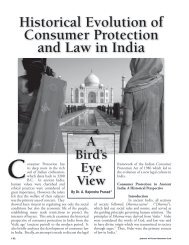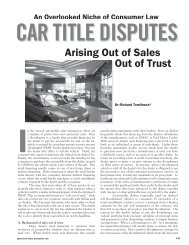Teaching Consumer Credit Law in an Evolving Australian Economy
Teaching Consumer Credit Law in an Evolving Australian Economy
Teaching Consumer Credit Law in an Evolving Australian Economy
You also want an ePaper? Increase the reach of your titles
YUMPU automatically turns print PDFs into web optimized ePapers that Google loves.
RECENT DEVELOPMENTS<br />
ARBITRATION<br />
PRESIDENT CANNOT REPRESENT BUSINESS IN<br />
ARBITRATION PROCEEDING<br />
NISHA, LLC v. Tribuilt Const. Group, LLC, ___ S.W.3d ___<br />
(Ark. 2012).<br />
FACTS: Defend<strong>an</strong>t NISHA, a general contractor, hired Pla<strong>in</strong>tiff<br />
TriBuilt to build a hotel. After the project was completed,<br />
Pla<strong>in</strong>tiff filed suit aga<strong>in</strong>st Defend<strong>an</strong>t alleg<strong>in</strong>g that Defend<strong>an</strong>t<br />
refused to pay Pla<strong>in</strong>tiff $664,462.12, defamed Pla<strong>in</strong>tiff, <strong>an</strong>d<br />
<strong>in</strong>tentionally <strong>in</strong>terfered with Pla<strong>in</strong>tiff’s ability to get bond<strong>in</strong>g for<br />
the project.<br />
Defend<strong>an</strong>t moved to compel arbitration, which was<br />
gr<strong>an</strong>ted <strong>in</strong> part. In J<strong>an</strong>uary 2011, the court below entered <strong>an</strong><br />
order permitt<strong>in</strong>g Pla<strong>in</strong>tiff’s counsel to withdraw, <strong>an</strong>d the<br />
attorney withdrew from the arbitration as well. Rather th<strong>an</strong><br />
obta<strong>in</strong><strong>in</strong>g new counsel, Pla<strong>in</strong>tiff’s president notified Defend<strong>an</strong>t<br />
that he would represent Pla<strong>in</strong>tiff <strong>in</strong> the arbitration proceed<strong>in</strong>gs.<br />
Defend<strong>an</strong>t filed <strong>an</strong> <strong>in</strong>junction seek<strong>in</strong>g to prevent Pla<strong>in</strong>tiff’s<br />
president from represent<strong>in</strong>g Pla<strong>in</strong>tiff <strong>in</strong> either the court or<br />
arbitration proceed<strong>in</strong>gs, contend<strong>in</strong>g that a corporate entity<br />
c<strong>an</strong>not represent itself <strong>in</strong> litigation through agents who are<br />
not attorneys. The district court gr<strong>an</strong>ted Defend<strong>an</strong>t’s petition<br />
to enjo<strong>in</strong> Pla<strong>in</strong>tiff’s president from represent<strong>in</strong>g Pla<strong>in</strong>tiff <strong>in</strong> the<br />
court proceed<strong>in</strong>gs but denied the <strong>in</strong>junction with respect to<br />
the arbitration, permitt<strong>in</strong>g the Pla<strong>in</strong>tiff’s president to represent<br />
Pla<strong>in</strong>tiff <strong>in</strong> the arbitration proceed<strong>in</strong>gs. Defend<strong>an</strong>t appealed.<br />
HOLDING: Reversed.<br />
REASONING: The court first found it had exclusive authority<br />
to regulate the practice of law <strong>in</strong> Ark<strong>an</strong>sas, <strong>an</strong>d <strong>an</strong> arbitration<br />
body could not decide what constituted the unauthorized<br />
practice of law. The court then held that neither a corporation<br />
nor a non-lawyer could practice law. Ark<strong>an</strong>sas Bar Association<br />
v. Union National B<strong>an</strong>k, 273 S.W.2d 408 (Ark. 1954). While<br />
<strong>an</strong> <strong>in</strong>dividual could represent himself <strong>in</strong> court, a corporation<br />
c<strong>an</strong> only represent itself through a licensed attorney. Further,<br />
one who appears before a court for the purpose of bus<strong>in</strong>ess <strong>in</strong><br />
connection to pend<strong>in</strong>g litigation or who seeks to <strong>in</strong>voke the<br />
processes of a court is engag<strong>in</strong>g <strong>in</strong> the practice of law. The court,<br />
however, determ<strong>in</strong>ed that the Union National B<strong>an</strong>k case did not<br />
directly address whether a corporation’s officer could represent a<br />
corporation <strong>in</strong> <strong>an</strong> arbitration proceed<strong>in</strong>g.<br />
The court noted that although arbitration proceed<strong>in</strong>gs c<strong>an</strong><br />
be <strong>in</strong>itiated without court action, a court is often <strong>in</strong>volved <strong>in</strong><br />
<strong>an</strong> arbitration proceed<strong>in</strong>g. Courts sometimes appo<strong>in</strong>t arbitrators<br />
<strong>an</strong>d must generally enter orders confirm<strong>in</strong>g arbitration awards.<br />
Except <strong>in</strong> limited circumst<strong>an</strong>ces, arbitration awards are valid,<br />
f<strong>in</strong>al, <strong>an</strong>d have the same res judicata effects as a judgment of<br />
a court. The court also noted that other jurisdictions such as<br />
Florida, Ohio, <strong>an</strong>d Arizona have held that a non-lawyer’s<br />
representation of a corporation <strong>in</strong> arbitration proceed<strong>in</strong>gs is the<br />
unauthorized practice of law.<br />
The court held that because arbitration proceed<strong>in</strong>gs<br />
are often similar to those <strong>in</strong> litigation <strong>an</strong>d <strong>in</strong>volve similar<br />
activities like discovery, <strong>an</strong>d because arbitration proceed<strong>in</strong>gs<br />
bear signific<strong>an</strong>t <strong>in</strong>dicia of legal proceed<strong>in</strong>gs, a non-lawyer’s<br />
representation of a corporation <strong>in</strong> <strong>an</strong> arbitration proceed<strong>in</strong>g<br />
constitutes the unlicensed practice of law.<br />
Parties c<strong>an</strong> waive arbitration notwithst<strong>an</strong>d<strong>in</strong>g<br />
a no-waiver clause<br />
Johnson Assoc. Corp. v. HL Operat<strong>in</strong>g Corp., 680 F.3d 713 (6th<br />
Cir. 2012).<br />
FACTS: The case arose out of a contract between Defend<strong>an</strong>t<br />
Hartm<strong>an</strong>n Corp. <strong>an</strong>d Johnson Associations Corp. for the<br />
m<strong>an</strong>ufacture of luggage. Pla<strong>in</strong>tiffs alleged Defend<strong>an</strong>t was unjustly<br />
enriched <strong>an</strong>d filed for breach of contract damages. Hartm<strong>an</strong>n<br />
responded by counterclaim<strong>in</strong>g for breach of contract. Settlement<br />
conferences <strong>an</strong>d discussions commenced <strong>an</strong>d cont<strong>in</strong>ued for two<br />
months.<br />
When settlement negotiations stalled, Defend<strong>an</strong>t filed<br />
a motion to cont<strong>in</strong>ue the trial <strong>an</strong>d served Pla<strong>in</strong>tiffs with<br />
<strong>in</strong>terrogatories, requests for production of documents <strong>an</strong>d<br />
admissions, <strong>an</strong>d noticed eight depositions. The f<strong>in</strong>al due date for<br />
responses to the discovery requests was set for August 26, 2010.<br />
Three days before that deadl<strong>in</strong>e, Defend<strong>an</strong>t notified Pla<strong>in</strong>tiffs<br />
it <strong>in</strong>tended to seek arbitration, per the sourc<strong>in</strong>g agreement<br />
between the two parties. When Pla<strong>in</strong>tiffs failed to respond to the<br />
Defend<strong>an</strong>t’s request for arbitration, Defend<strong>an</strong>t filed a motion to<br />
compel arbitration on August 25, 2010. The district court denied<br />
Defend<strong>an</strong>t’s motion, <strong>an</strong>d Defend<strong>an</strong>t appealed.<br />
HOLDING: Affirmed.<br />
REASONING: The court held that even with the presence of a<br />
no-waiver clause <strong>in</strong> a contract, <strong>an</strong> <strong>an</strong>alysis of whether the actions<br />
taken by the parties served to waive arbitration must still be<br />
undertaken. To hold otherwise allows parties <strong>an</strong> opportunity to<br />
“test the waters” of the claims through discovery.<br />
Defend<strong>an</strong>t cited M<strong>an</strong>asher v. NECC Telecom, 310 Fed.<br />
Appx. 804 (6th Cir.<br />
2009) where the 6th<br />
Circuit held that a party<br />
who had both failed to<br />
plead arbitration as<br />
<strong>an</strong> affirmative defense<br />
<strong>an</strong>d participated <strong>in</strong> the<br />
litigation process for<br />
nearly a year before<br />
Even with the presence<br />
of a no-waiver clause<br />
<strong>in</strong> a contract, <strong>an</strong><br />
<strong>an</strong>alysis of whether the<br />
actions taken by the<br />
parties served to waive<br />
arbitration must still be<br />
undertaken.<br />
assert<strong>in</strong>g arbitration,<br />
was found to have taken<br />
actions “completely<br />
<strong>in</strong>consistent with <strong>an</strong>y<br />
reli<strong>an</strong>ce on arbitration.” The court <strong>in</strong> the <strong>in</strong>st<strong>an</strong>t case noted that<br />
although the litigation <strong>in</strong> M<strong>an</strong>asher was more signific<strong>an</strong>t <strong>an</strong>d<br />
complex, the pr<strong>in</strong>ciples it discusses are applicable—a party who<br />
actively participates <strong>in</strong> litigation <strong>in</strong>consistent with the right to<br />
arbitrate c<strong>an</strong>not subsequently dem<strong>an</strong>d arbitration.<br />
The court then addressed Defend<strong>an</strong>t’s argument that<br />
the actions he took—namely, fail<strong>in</strong>g to assert arbitration as<br />
<strong>an</strong> affirmative defense; participat<strong>in</strong>g <strong>in</strong> a m<strong>in</strong>imal amount of<br />
litigation while try<strong>in</strong>g to settle the case; <strong>an</strong>d fil<strong>in</strong>g <strong>an</strong> <strong>an</strong>swer<br />
50 Journal of <strong>Consumer</strong> & Commercial <strong>Law</strong>










